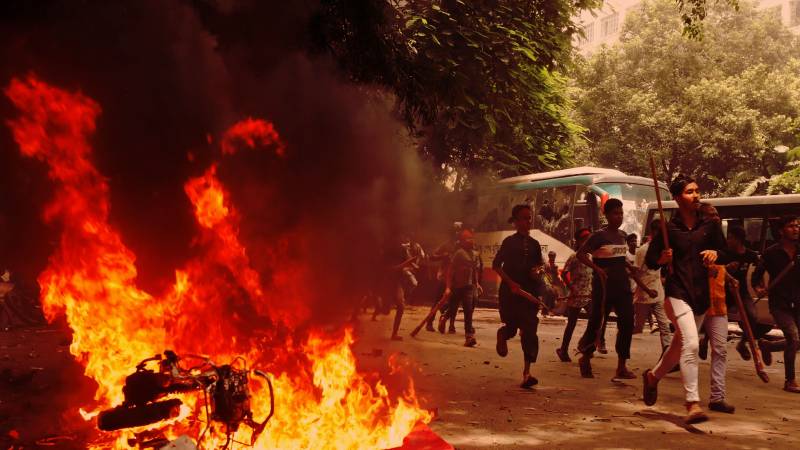
Bangladesh is navigating a delicate transition after the resignation of Prime Minister Sheikh Hasina earlier this year. However, claims by Indian media of widespread violence against the Hindu minority have been refuted by prominent journalist Muktadir Rashid.
Speaking on “Unraveled with Marvi Sirmed”, Rashid criticized what he called the ‘propaganda and fake news’ perpetuated by India's "Godi Media," asserting that such narratives distort the reality on the ground. He stated that while sporadic attacks occurred in early August, the situation has been largely controlled, and it is far better now than it was three months ago. Rashid also dismissed Indian media’s claim that the resistance movement against Sheikh Hasina was sponsored by Pakistan.
Although Bangladesh has long been considered a secular stronghold in South Asia, it is currently grappling with escalating violence and political uncertainty following Sheikh Hasina’s resignation in August. The unrest, marked by attacks against the Hindu minority, has raised concerns about the country’s social fabric and its relationship with neighboring India.
Muktadir Rashid, an award-winning Bangladeshi journalist, painted a nuanced picture of the crisis in a fresh episode of Unraveled. “There are incidents of violence, but the idea that the Hindu minority is under constant attack is simply not true,” Rashid said. “This is a deliberate attempt to misrepresent the situation and tarnish the social fabric of Bangladesh, which remains strong and resilient.”
Rashid emphasized the "unbreakable bond" between the people of Bangladesh and India, rooted in shared history and culture. However, he issued a stark warning to New Delhi: harboring Sheikh Hasina, whom he accused of committing human rights violations, risks alienating the Bangladeshi public.
“India should respect the sentiments of Bangladeshis, who are angry over the atrocities committed by Sheikh Hasina’s regime,” Rashid said. “Harboring a mass murderer like her on Indian soil undermines the values of democracy and human rights that India claims to uphold.”
“The Yunus government is doing its best to manage the situation,” said Rashid. “There has been significant improvement since the chaotic days following Sheikh Hasina’s departure, but there is still room for progress.”
Violence Against Minorities: Myths and Realities
While acknowledging isolated incidents of violence against the Hindu community, Rashid dismissed claims of systematic targeting. He highlighted efforts by Bangladeshis, including Muslim communities, to protect Hindu temples and promote harmony.
“Most of the violence occurred during the brief power vacuum after Sheikh Hasina’s departure,” Rashid explained. “The government has since taken action in many cases, and the perpetrators are being held accountable.”
Bangladesh’s Hindu community has borne the brunt of the unrest. According to the Bangladesh Hindu Buddhist Christian Unity Council, over 200 incidents of violence have been reported across 50 districts since August. Rashid emphasized that while the attacks are deeply concerning, the perpetrators often represent fringe elements rather than mainstream political or religious groups.
“Most incidents are isolated and do not reflect the broader social fabric,” he explained. “The government has acted against the culprits in many cases, but gaps in justice and accountability persist.”
India’s Role and Response
Rashid criticized India’s support for Sheikh Hasina as shortsighted, urging New Delhi to reassess its approach to Bangladesh. “The relationship between the two nations must prioritize the people, not individual leaders,” he said. “India should stop aligning itself with figures like Sheikh Hasina, whose actions have deeply hurt the Bangladeshi populace.”
He called on India to recognize the potential damage to bilateral ties if it continues to shelter Hasina, urging it to focus on building a relationship with the Bangladeshi people instead. “India shelters Sheikh Hasina while ignoring the sentiments of Bangladeshi citizens,” he remarked. “This has strained the historical goodwill between the two nations.”
India, Bangladesh’s closest neighbor that helped the Bangladeshi people in their war of independence from Pakistan in 1971—an act that created permanent and deep scars in India-Pakistan relations, which persist to this day—has expressed deep concern over the violence, particularly as it impacts the Hindu minority. Rashid, however, criticized India’s response as inconsistent, accusing New Delhi of prioritizing political interests over humanitarian concerns.
Rashid also highlighted the potential risks of long-term estrangement between the countries. “Bangladeshi people respect India, but they reject what they perceive as favoritism toward certain political actors.”
Organic Movement, Not Supported by Pakistan’s ISI
Rashid attributed the recent political upheaval to organic grassroots movements against authoritarianism rather than Islamist conspiracies or foreign interference. He strongly refuted the claims made by Indian media that the uprising against Sheikh Hasina’s government was instigated and orchestrated by Pakistan’s infamous intelligence agency, the ISI. “This was a people’s uprising—led by students, workers, and civil society,” he said. “To suggest otherwise is an insult to the courage and determination of Bangladeshis,” he added.
A Glimmer of Hope
Despite the turmoil, Rashid expressed optimism about Bangladesh’s future, pointing to the resilience of its citizens and their commitment to democratic values. “Bangladeshis are learning to navigate crises with maturity,” he said. “With time and international support, this nation has the potential to emerge stronger and more united.”
Challenges Ahead
However, challenges remain. Rashid warned that political instability, coupled with the erosion of secularism, could further polarize society. He urged the government and international community to prioritize inclusivity and justice. “Bangladesh must guard against sectarianism and work toward a centrist political ideology,” he concluded. “The world is watching, and the stakes are high.”
As Bangladesh confronts its most significant political crisis in years, the path forward will require not just domestic reform but also renewed regional and international cooperation. The story of this nation, Rashid reminds us, is far from over.
The episode of Unraveled with Marvi Sirmed featuring Muktadir Rashid is available on New Wave Global’s video platform here.
